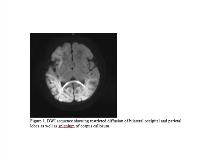Acute Symptomatic Neonatal Seizure Secondary to Congenital Hyperinsulinism
Abstract number :
1.213
Submission category :
4. Clinical Epilepsy / 4B. Clinical Diagnosis
Year :
2018
Submission ID :
501127
Source :
www.aesnet.org
Presentation date :
12/1/2018 6:00:00 PM
Published date :
Nov 5, 2018, 18:00 PM
Authors :
Isaac A. Molinero, Albert Einstein College of Medicine; Cristina Fernandez-Carbonell, Albert Einstein College of Medicine; and Elissa Yozawitz, Albert Einstein College of Medicine
Rationale: Congenital hyperinsulinism is the most frequent cause of severe, persistent hypoglycemia in newborns. Symptoms may be non-specific and include lethargy, poor feeding and seizures. Approximately 45% of affected individuals have pathogenic variants in either ABCC8 or KCNJ11 gene. We present a case of acute neonatal seizures secondary to congenital hyperinsulinism which improved after subtotal pancreatectomy. Methods: Three day old baby girl born at 39 weeks via NSVD to a 24 year old G2 P1001 mother, Apgar scores 9, 9. She returned to the hospital 24 hours after discharge because of lethargy and poor feeding. Workup revealed significant hypoglycemia (glucose <20g/dl). She was noted to have eye deviation to the left with bilateral arm and leg clonic movements. She required multiple boluses of phenobarbital, fosphenytoin, and levetiracetam in addition to a glucose infusion to achieve seizure control. EEG captured multiple seizures coming from the left central region. Brain MRI showed restricted diffusion involving the parietal and occipital lobes bilaterally as well as the splenium of the corpus callosum. Genetic testing confirmed a pathogenic mutation on the ABCC8 gene consistent with congenital hyperinsulinism. She underwent a 5% pancreatectomy with resection of a focal lesion identified on pre-operative 18F DOPA PET scan. Her glucose and seizures are now well controlled and she is gaining developmental milestones. Results: No results to report Conclusions: Acute symptomatic neonatal seizures represent the majority of neonatal seizures in term newborns. Seizures should always be considered a symptom and one must always search for the etiology. This is an example of difficult to control neonatal seizures with significant improvement once the underlining etiology was identified and appropriately treated. Funding: None

.tmb-.jpg?Culture=en&sfvrsn=bf2c5a8e_0)